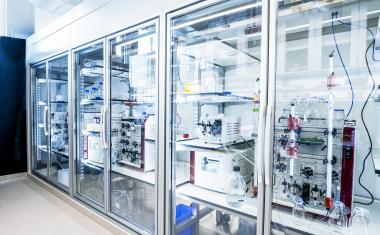AI-Powered Knowledge Transfer in Manufacturing
Artificial intelligence (AI) can help companies in the process industry capture, retain and access valuable historical expertise and ease the transition for new colleagues in the plant.

Bayer CropScience solved the challenging knowledge transfer with the AI-powered module Smart Search. The module is part of the Plant Process Management (PPM) solution Shiftconnector by the global software provider Eschbach.
“Knowledge transfer is a big issue in shift operations,” explains Matthias Heskamp, former Head of Site Operations and Excellence at Bayer CropScience in Muttenz, Switzerland. “In a 24/7 plant operation, data is generated around the clock. That’s 168 hours per week. Day operations teams, responsible for coordinating problem solving, only work 40 hours per week, but need to access information that is generated 24/7.”
The responsibility of keeping all manufacturing processes up and running depends on the collaboration of many stakeholders in various departments, including engineering, board and field operations, research and development, maintenance, and plant management. Several years ago, Bayer CropScience implemented Shiftconnector as a PPM solution to improve communication and information transfer across shifts, departments, and different levels of hierarchies.
The PPM solution gathers data generated by users, such as shift notes, logs, and observations, as well as automated data retrieved from sensors. In doing so, machine data receives relevant context, which serves as crucial background information, shows the full picture of specific plant operations, and is important for decision-making when process upsets occur. Bayer CropScience is further optimizing its production with a new AI-based module.
Process-Relevant Information Meets AI
Important best practices and experiences that go beyond the knowledge documented in writing, i.e. explicitly in training documents or standard operating procedures (SOPs), often remain hidden in the minds of employees. As soon as those workers leave the company, relevant knowledge might be lost. Day operations teams need exactly this implicit know-how to evaluate the production processes and make the right decisions in cases of events and process upsets.
With Shiftconnector, manufacturing teams generate vast volumes of information in every single shift, and all these inputs have become a huge repository of historical knowledge. Mining this big and valuable source of expertise can help shift teams discover opportunities for continuous improvement, learn from prior mistakes, and find solutions for recurring problems.

AI-infused Smart Search enables to tap the valuable implicit knowledge of experienced manufacturing teams. © Eschbach
That’s where AI comes in. AI-driven applications can quickly browse through large volumes of data to identify patterns and surface insights that would be difficult or impossible for humans to discern within a reasonable timeframe. National language processing (NLP), a specific area of AI, enables the system to process queries and instructions provided in plain language, derive meaningful information from text-based sources, and return results that humans can understand.
“AI helps our employees work as efficiently as possible.”
Matthias Heskamp, former Head of Site Operations and Excellence, Bayer CropScience
Custom-Oriented Design
Process-relevant information that is processed with a smart application offers an opportunity for greater efficiency and safety in manufacturing. AI also makes it possible to collect implicit knowledge to make employees’ experiences available for future generations.
Capturing and managing knowledge is domain-specific, which is why Smart Search is designed with customers in mind. The software provider worked closely with Bayer CropScience and the University of Göttingen to develop the AI-driven module. “In the field of NLP, applications such as chatbots already work very well for common conversations, but specialized domains, such as the chemical and pharmaceutical process industries, need solutions tailored to their exact needs,” explains Bela Gipp, professor at the University of Göttingen. “Key to the success of this project was the close collaboration with the customer from the very beginning to understand their specific use cases, jargon and pain points.”
Using NLP, Smart Search can comprehend the meaning and context of a query to surface the most relevant results. In addition to filtering stored information, the module can process communications by cataloging and indexing topics, keywords, phrases and more. This far surpasses what we know from internet search engines. The tool provides exclusive plant insights, and, in the event of disruptions, delivers solutions that have already been proven to work.
From Ideation to Implementation
Smart Search at Bayer CropScience was taken from ideation to implementation within only two years, and long before AI consumer apps like ChatGPT went viral. It was built using industry- and plant-specific terminology, data formats and information provided by process engineers, board operators and shift leaders during workshops and onsite investigations. The result is an AI-infused system that is highly customized to the client’s workflows, language, and requirements.
Workers can now quickly uncover the information they need to perform their jobs more effectively. For example, if a problem develops at a particular point in a process, they can simply submit a query such as ‘Dark color of product?’ to easily identify any previous instances of the problem and what was done to resolve it. “Smart Search has reduced the amount of time our employees spend searching for relevant information, often from several hours to mere minutes,” Heskamp adds. “AI helps our employees to work as efficiently as possible.” This enables faster troubleshooting, facilitates problem resolution, and improves plant performance.
Smart Search has transformed Bayer’s Shiftconnector installation from an information repository and standard shift communication system to a future-proof, intelligent knowledge hub. Workers at Bayer can quickly scan a decade of information to find what they need at any moment. This means that the wisdom and lessons of the past are stored and readily available for workers today and tomorrow. It can be integrated into any Shiftconnector installation based on Eschbach’s cloud and adapted to the precise needs on-site.

Shift Connector © Eschbach
Next-Generation Knowledge Management Platform
Looking forward, knowledge management will be essential to helping process manufacturers adapt to new workforce realities. In 2021, the German Institute for Employment Research (Institut für Arbeitsmarkt- und Berufsforschung) predicted that, statistically speaking, around 15% of people in employment will disappear from the German labor market by 2030.
A knowledge management platform with AI can help companies retain valuable tacit knowledge from experienced operators, technicians and engineers and make it accessible for the coming generation. Over the next few years, Shiftconnector will provide increasingly diversified AI-based applications, including features that may help users understand search results faster by providing a meaningful classification of results and offering complete text-based instructions for troubleshooting.
Maximizing the effectiveness of younger, less experienced shift teams using Smart Search will help companies address the skill gap and get more done with a smaller workforce. Eschbach’s aim is to increase efficiency in the process industry, boost productivity, and ultimately ensure a seamless transfer of knowledge.
Author: Andreas Eschbach, CEO, Eschbach GmbH, Bad Säckingen, Germany

“Sifting through huge amounts of data to find the information needed can be a very time-consuming and cumbersome job for shift teams.”



















